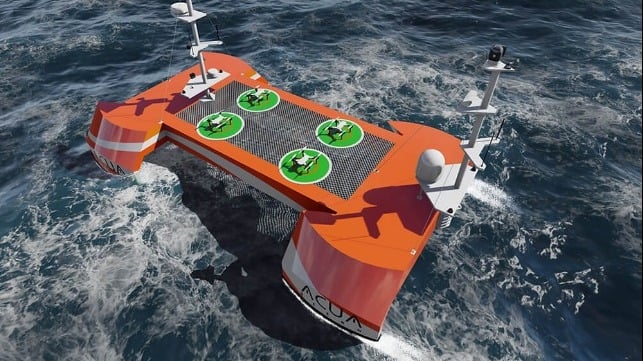Design Approval for First Hydrogen-Powered Autonomous Surface Ship

Designs for the world’s first zero-emission hydrogen-powered maritime autonomous surface ship (MASS) are progressing providing the potential to greatly enhance the applications and benefits of the technology according to a British start-up named ACUA Ocean. The company reports it has completed prototype testing, receiving design approval for key components as they work to introduce commercial designs that can be manufactured at scale to reduce the capital costs of employing the technology.
ACUA reports that it is receiving the first approval in principle (AiP) from classification society Lloyd’s Register. Included in the design approval according to the company will be its hydrogen system, control engineering system, and electrical power distribution systems, key components that will be employed in a new class of MASS vessels.
The company points to the growing interest in MASS and the range of applications that can be developed for monitoring the world’s oceans. They point to the need for climate monitoring vessels and applications to detect threats and anomalies, such as objects in the water, water spills, and incursions. However, according to the company, current USV designs rely on diesel generators which limits their commercial viability. They point to the low endurance and restricted payload capacity as well as the requirement for regular manned maintenance.
By using hydrogen to power their vessels, ACUA Ocean reports that it will be able to increase range, speed, and endurance without scarifying power. According to the company, they are proceeding with designs for the world’s first long-endurance MASS powered by liquid hydrogen. They believe they can provide a long endurance of 70 days or more operating at 5 knots. Their design also has a peak speed of 20 knots and a payload capacity of 4,500 kg. By reducing the maintenance requirements their MASS will be able to offer more operation time on site.
Prototype trials were completed in March as part of the UK’s Clean Maritime Demonstration Competition. The company is also working with Ad Hoc Marine Designs on the development of its H-USV to provide monitoring and offshore data collection. ACUA Ocean’s vessels will be provided with a suite of onboard sensors, communicate using VHF and LRAD systems while recording HD and thermal video for use as evidence. A rendering shows the design outfitted with four drones as part of its capabilities. They are also using a catamaran design for the increased stability.

that matters most
Get the latest maritime news delivered to your inbox daily.
“Uncrewed and autonomous surface vessels represent the future of the maritime industry, offering increased scalability and safety,” said Neil Tinmouth, CEO at ACUA Ocean. “Working with Lloyd’s Register and Ad Hoc Marine Designs has enabled us to ensure the vessel aligns with regulatory standards and operational requirements. As the adoption of net-zero propulsion systems accelerates, we see a clear strategic advantage as the first to market.”
Hydrogen they point out will reduce the need for refueling the vessel and when manufactured at scale they believe capital costs can be reduced by a third making the MASS cost-effective. Further over their lifespan, the MASS will save up to 50 percent versus the operating cost of manned vessels.
